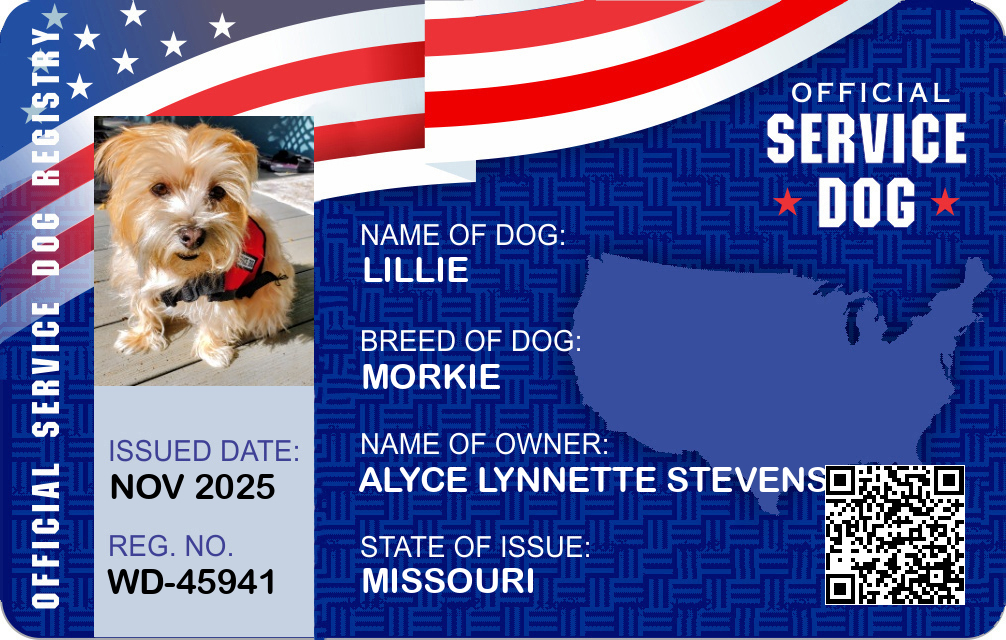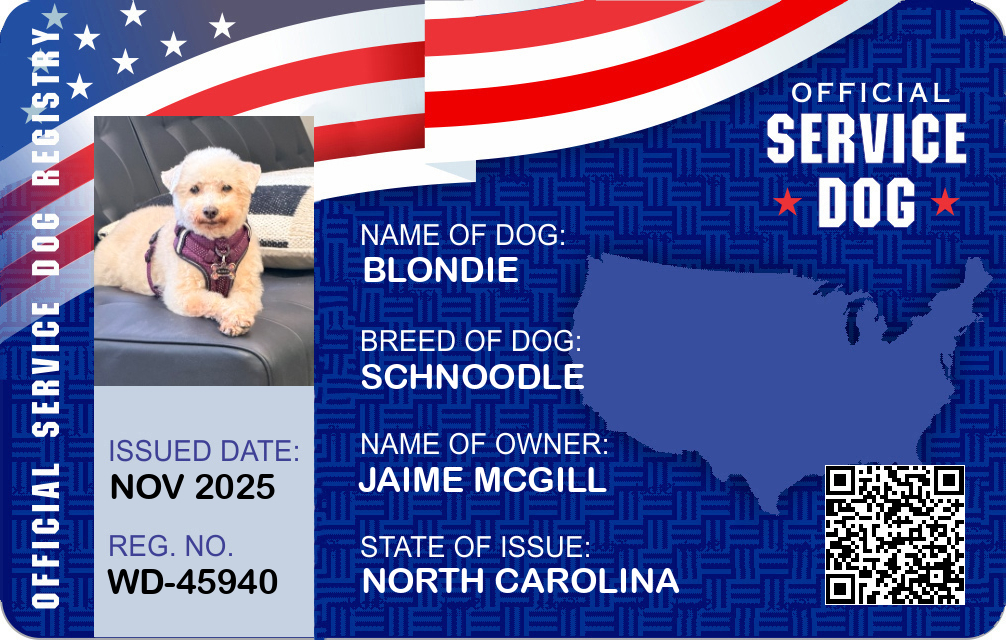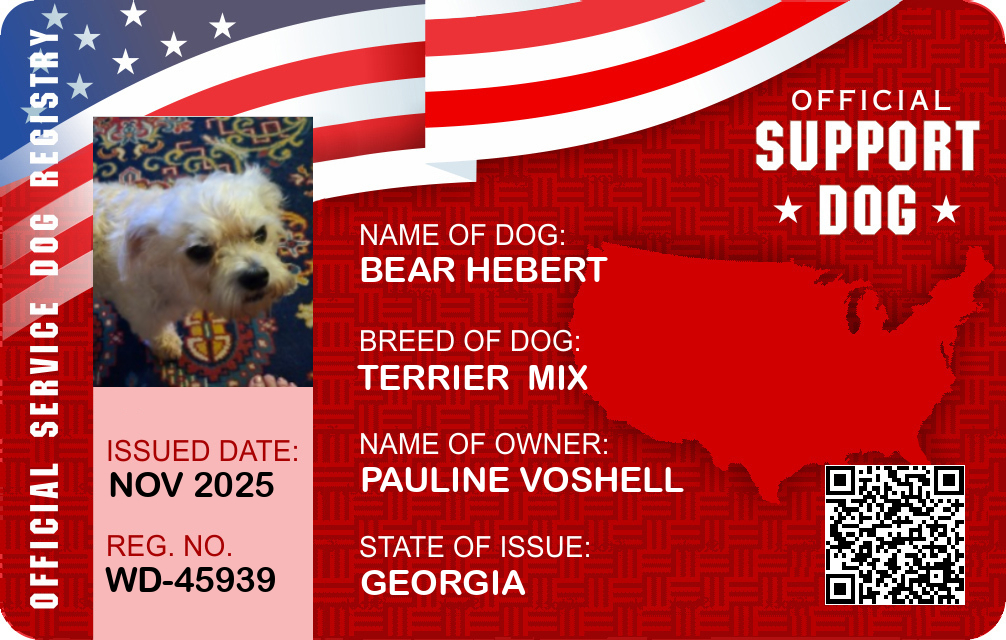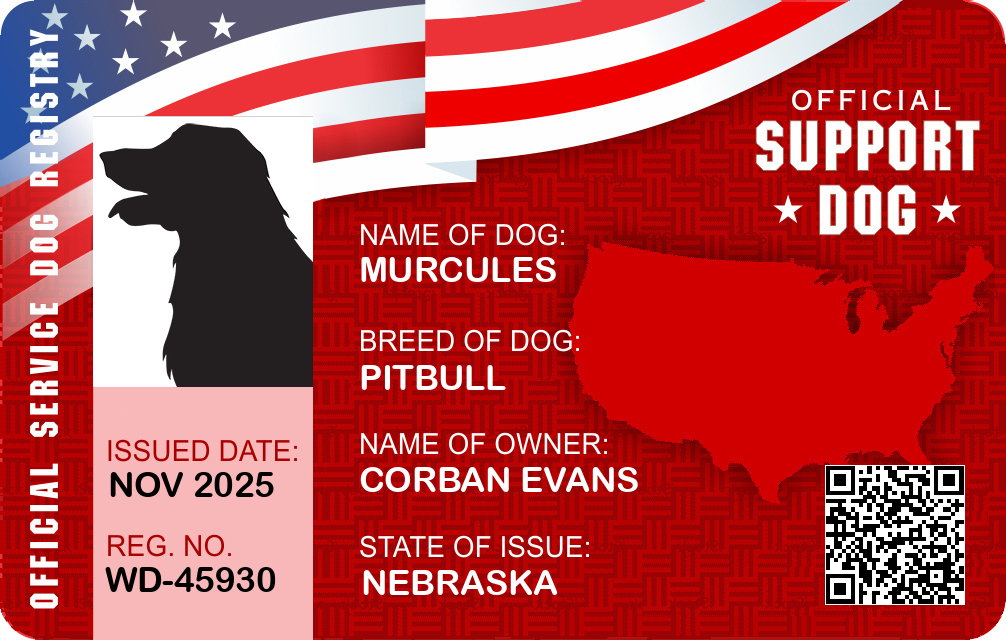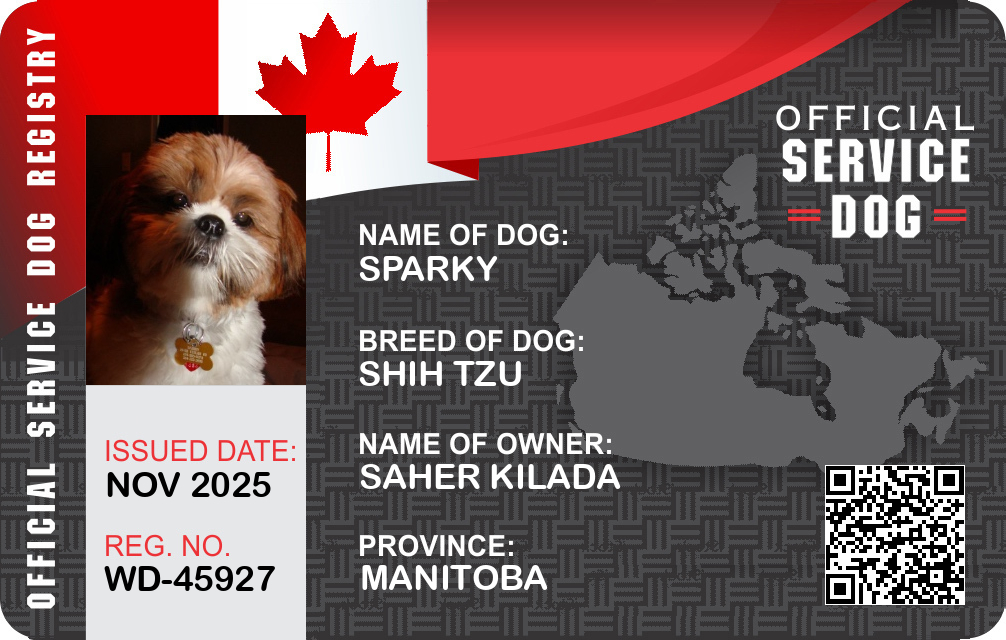Alaska Service Dog Laws
Register Your Dog
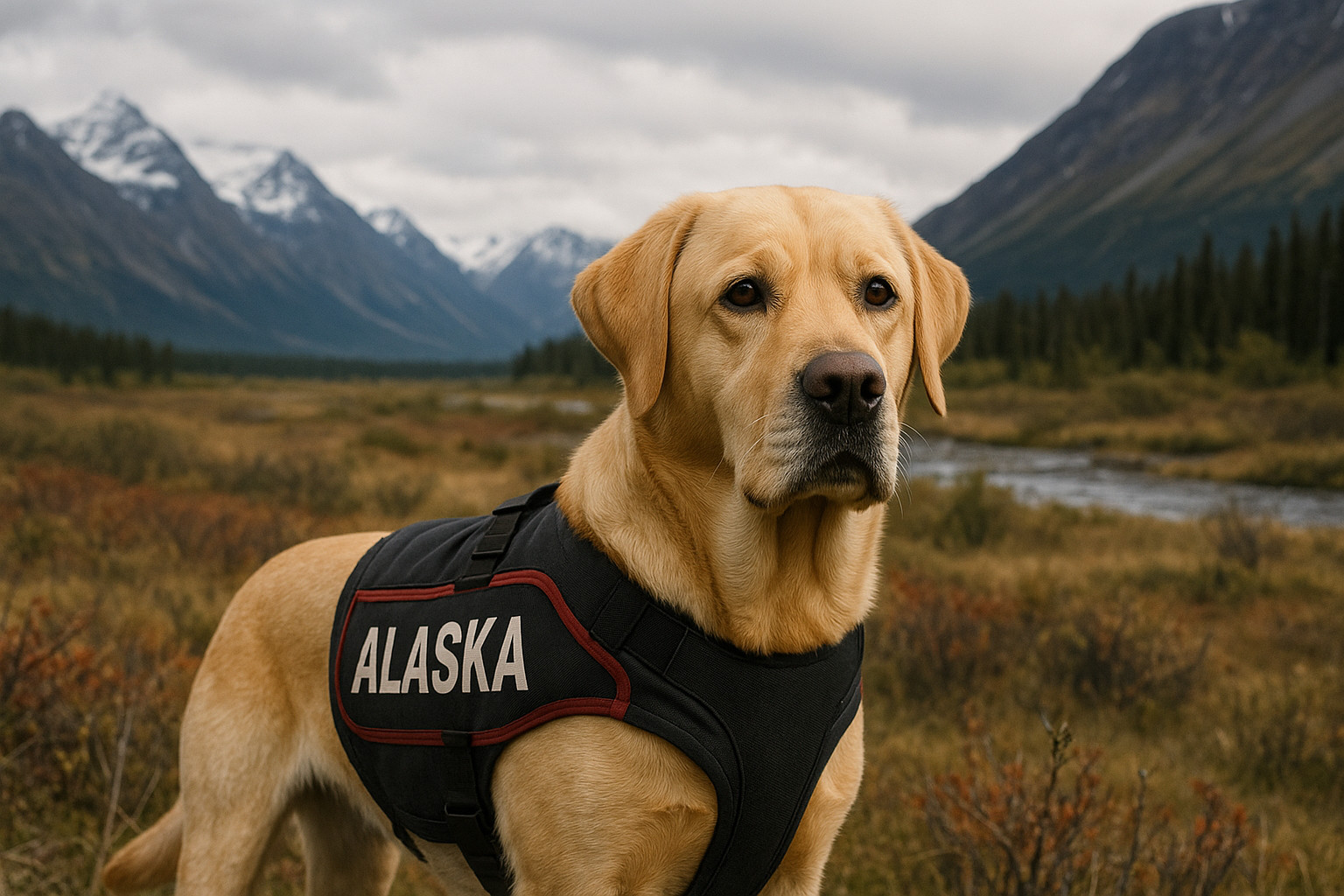
Overview of Service Dog and Legal Definitions in Alaska
What is a Service Dog?
Under the Americans with Disabilities Act (ADA), a service dog is any dog individually trained to perform specific tasks for a person with a disability. These tasks must be directly related to the person’s disability, such as guiding individuals with visual impairments, alerting those who are deaf, pulling a wheelchair, or retrieving items for someone with mobility issues. In Alaska, the definition aligns with the ADA, ensuring consistency in what qualifies as a service dog.
How Service Dogs Differ from Other Types of Assistance Animals
Service dogs are distinct from other assistance animals, such as emotional support animals (ESAs) or therapy animals. Unlike service dogs, ESAs provide comfort and support without specific task training. Therapy animals are typically used in therapeutic settings to assist multiple people and do not enjoy the same legal protections as service dogs. Therefore, Alaska recognizes only those dogs trained to perform specific tasks for their handlers as service dogs.
Key Federal Laws Affecting Service Dogs (e.g., ADA, FHA, ACAA)
Federal laws, including the Americans with Disabilities Act (ADA), the Fair Housing Act (FHA), and the Air Carrier Access Act (ACAA), provide the foundation for service dog regulations across the United States, including in Alaska. The ADA mandates public accessibility for service dogs, the FHA addresses housing accommodations, and the ACAA regulates airline transport of service animals. Each of these laws provides protections and defines the scope within which service dogs operate.
State-Specific Service Dog Laws in Alaska
Alaska complements federal laws with its statutes. State laws uphold the public access rights of service dogs and their handlers, reinforcing the ADA’s stipulations about accessibility in public places. However, Alaska also defines the penalties for misrepresentation of pets as service animals more specifically than federal law, addressing a growing concern about fraudulent claims.
Housing Rights and Responsibilities
In Alaska, the FHA’s provisions are echoed in state housing policies ensuring that service dog handlers have the right to live with their service animals, even in properties that typically restrict pets. Landlords must make reasonable accommodations for these service animals, and they cannot charge additional pet fees, although they can charge for damages the service dog may cause.
Public Access and Accommodation
Alaska’s laws ensure service dogs and their handlers have unhindered access to public accommodations. This includes a wide array of public and private facilities such as restaurants, hotels, and stores. Business owners can only inquire whether the dog is a service animal required due to a disability and what tasks the dog has been trained to perform. They cannot demand documentation or ask about the nature of the handler’s disability.
Transportation and Travel Rules
Transportation laws in Alaska comply with federal regulations. The ACAA allows service dogs to travel with their handlers on commercial airlines at no additional charge. In addition, public transportation systems in Alaska, such as buses and trains, must accommodate service dogs. The handler has the right to keep the service dog with them, rather than in a separate area, facilitating better access and functional assistance during travel.
Employment and Workplace Considerations
The ADA also covers employment rights in Alaska, mandating employers to provide reasonable accommodations for employees with service dogs, as long as it does not cause undue hardship to the business operations. This may include modifying workspaces to accommodate the service animal’s presence or allowing modified schedules for employees who require their service dog’s assistance.
Documentation, Requirements, and Processes in Alaska
Service Dog Documentation and Who Can Issue It
While there is no mandatory service dog certification at the federal or state level in Alaska, handlers might carry identificat
ion or certification voluntarily for ease of public access. These are often issued by the training organization but have no legal obligation. It is vital that handlers understand that businesses or landlords in Alaska cannot legally demand documentation as proof beyond the minimal questioning allowed.Landlord, Business, and Provider Verification Rules
Verification of a service dog is limited to the two questions allowed by the ADA: if the dog is required due to a disability, and what tasks the dog has been trained to perform. Landlords or business owners in Alaska can be penalized if they deny access or housing based on demands for unauthorized documentation or indicate a lack of understanding of service dog definitions.
Rights, Limitations, and Legal Risks
Rights Service Dog Handlers Have in Alaska
The rights granted to service dog handlers in Alaska encompass access to public spaces, housing, and employment without discrimination. Handlers are legally empowered to question any improper denial of access based on their need for a service animal, with state and federal law on their side ensuring equal treatment.
Limits on Service Dog Protections and Common Restrictions
Despite the comprehensive rights, service dog protections in Alaska have limitations. For instance, any animal, including a service dog, may be excluded if it poses a direct threat to the health and safety of others or is not under control. Service dogs must maintain proper behavior in public settings to retain their access rights.
Penalties for Fraud or Misrepresentation
Alaska addresses the issue of misrepresentation seriously. There are fines imposed on individuals who falsely claim their pet as a service animal, which can include monetary penalties and community service. Misrepresentation undermines the integrity of service dog programs and can lead to wider mistrust, thus being treated sternly under Alaskan law.
Practical Guidance for Service Dog Handlers in Alaska
How to Qualify for a Service Dog Legitimately
To qualify for a service dog in Alaska, potential handlers must have a recognized disability and require a dog that is trained to perform tasks that mitigate the disability. Consulting with a licensed mental health professional or medical provider is a good starting point to evaluate needs and pursue a qualified service dog training program.
How to Talk to Landlords, Airlines, and Employers
Service dog handlers in Alaska should approach discussions with landlords, airlines, and employers armed with knowledge of their rights under both federal and state law. Calmly explaining the service dog’s role and being prepared to discuss the task-specific nature of the animal’s training under the ADA can defuse potential confrontations and ensure smoother communications.
Summary of Service Dog Laws in Alaska
- **Alaska aligns with federal ADA regulations for service dog definitions and handler rights.
- Housing rights in Alaska protect handlers from pet-related fees and allow service animals regardless of pet policies.
- Public access is ensured with protections against discrimination or denial of entry to public accommodations.
- Travel laws allow service dog presence on airlines and public transit, consistent with the ACAA.
- Employment rights demand reasonable accommodations for service dog handlers without undue business hardship.
- Businesses and landlords in Alaska are only allowed limited inquiries about service dogs, strictly avoiding demands for papers or documentation.
- Misrepresenting a pet as a service dog carries penalties, safeguarding the integrity of service dog status.
- To comply with Alaska’s laws, handlers should be knowledgeable about their rights, prepared to explain their service dog’s role, and ensure that their dog is trained and well-behaved in public spaces.**
By adhering to these guidelines and being well-informed, service dog handlers in Alaska can effectively navigate their rights and responsibilities, ensuring both compliance with the law and the valuable assistance of their service animals.



